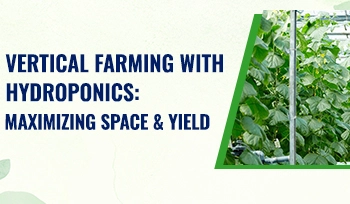
Vertical Farming with Hydroponics: Maximizing Space and Yield
In the realm of modern agriculture, where land availability and environmental concerns pose significant challenges, hydroponics emerges as a promising solution. Among various hydroponic techniques, vertical farming stands out for its ability to maximize space utilization and yield production. As a pioneering hydroponics company in India, InHydro spearheads the integration of vertical farming with hydroponic systems, revolutionizing agricultural practices while addressing sustainability concerns.
Benefits of Vertical Farming with Hydroponics
- Space Utilization: InHydro optimizes vertical space, maximizing production in urban environments.
- Higher Yields: Advanced systems ensure precise nutrient delivery, leading to increased productivity.
- Reduced Environmental Impact: InHydro prioritizes sustainability, minimizing water usage and emissions.
- Year-Round Cultivation: Vertical farms ensure consistent supply regardless of seasons.
- Local Food Production: InHydro promotes local produce distribution, enhancing food security.
Maximizing Space Utilization:
Traditional farming methods often face limitations due to land scarcity and urbanization. Vertical farming offers a viable alternative by optimizing vertical space, making it suitable for urban environments and areas with limited arable land. InHydro’s innovative approach to vertical farming harnesses unused vertical spaces in urban settings, transforming them into productive agricultural zones. By stacking multiple layers of hydroponic systems vertically, growers can cultivate a diverse range of crops without the need for vast expanses of land.
Enhancing Yield Production:
Vertical farming with hydroponics offers unparalleled control over environmental factors crucial for plant growth. InHydro’s advanced hydroponic systems ensure optimal conditions for plants, including precise nutrient delivery, pH regulation, and water management. By eliminating soil-borne diseases and minimizing water usage, hydroponic vertical farms can achieve higher yields compared to conventional farming methods. InHydro’s expertise in hydroponic farming training and consulting services empowers growers to maximize yield potential through efficient crop management practices.
Environmental Sustainability:
InHydro’s vertical farming solutions align with principles of environmental sustainability by reducing the carbon footprint associated with traditional agriculture. By minimizing land usage and water consumption, hydroponic vertical farms conserve natural resources while mitigating the adverse impacts of agriculture on ecosystems. Furthermore, the controlled environment of vertical farms enables year-round cultivation, ensuring consistent crop supply and reducing dependence on seasonal fluctuations.
Commercial Viability:
For commercial hydroponic farming ventures, vertical farming presents an attractive proposition due to its scalability and efficiency. InHydro’s commercial vertical hydroponic systems are designed to meet the diverse needs of agripreneurs, offering customizable solutions tailored to specific crop requirements and space constraints. With InHydro’s expertise in hydroponic consulting services, growers can optimize their vertical farming operations for maximum productivity and profitability.
Empowering Hobbyists:
In addition to commercial farming, InHydro caters to hobbyists and enthusiasts interested in indoor hydroponic gardening. Hobby hydroponics garden kits provided by InHydro allow individuals to experience the joys of hydroponic gardening firsthand, regardless of available outdoor space. These compact and user-friendly kits enable hobbyists to cultivate fresh herbs, leafy greens, and other crops year-round, fostering a deeper connection with nature and sustainable food production practices.
In conclusion, vertical farming with hydroponics represents a paradigm shift in agriculture, offering a sustainable solution to food security and environmental challenges. InHydro’s expertise as a leading hydroponics company in India plays a pivotal role in driving the adoption of vertical farming practices. By maximizing space utilization, enhancing yield production, and promoting environmental sustainability, vertical farming with hydroponics holds the key to a more resilient and prosperous future for agriculture.
